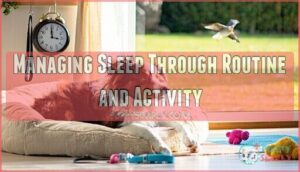This site is supported by our readers. We may earn a commission, at no cost to you, if you purchase through links.

Exercise levels, environment, and diet all play roles in sleep quality. You’ll notice healthy sleep includes multiple naps plus longer deep sleep periods, complete with occasional dream twitches. Getting their sleep right isn’t just about rest – it’s the foundation for everything else.
Table Of Contents
- Key Takeaways
- How Much Sleep Do Australian Shepherds Need?
- How Age Affects Australian Shepherd Sleep
- Factors Influencing Sleep in Australian Shepherds
- Recognizing Healthy Sleep Habits
- Common Sleep Issues and Disorders
- Creating a Sleep-Friendly Environment
- Managing Sleep Through Routine and Activity
- When to Consult a Veterinarian About Sleep
- Frequently Asked Questions (FAQs)
- How does weather impact my Aussie’s sleep?
- Should I wake my Aussie from a nightmare?
- How can I get my senior Aussie to sleep through the night?
- What are signs that my Aussie is not getting enough sleep?
- Can Australian Shepherds dream during sleep?
- Do weather changes affect sleep patterns?
- Should I wake my sleeping Australian Shepherd?
- How does spaying/neutering impact sleep needs?
- Are there breed-specific sleep medications available?
- Conclusion
Key Takeaways
- Your Australian Shepherd needs 12-14 hours of sleep daily, with puppies and seniors requiring up to 18 hours for proper growth and recovery.
- You’ll see healthy sleep patterns include multiple power naps throughout the day, plus longer deep sleep periods with occasional dream twitches.
- Create a consistent routine with regular exercise, quiet sleep areas, and calming bedtime activities to improve your dog’s sleep quality.
- Watch for sleep changes like excessive sleepiness, insomnia, or difficulty settling, as these can signal health issues requiring veterinary attention.
How Much Sleep Do Australian Shepherds Need?
Your Australian Shepherd needs 12 to 14 hours of sleep daily to maintain ideal health and energy levels.
A rested Aussie is a happy Aussie—12-14 hours keeps these energetic dogs balanced and ready for adventure
Sleep requirements vary considerably based on your dog’s age, with puppies and seniors needing up to 18 hours while healthy adults usually require the standard amount.
Average Daily Sleep Requirements
Your Australian Shepherd needs 12-14 hours of daily rest to thrive. These sleep patterns include multiple sleep cycles throughout the day, combining power naps with deeper rest periods.
Australian Shepherd sleep needs vary based on activity levels and individual characteristics. Understanding proper rest duration helps you recognize healthy sleep habits and guarantee your dog gets adequate recovery time for superior well-being.
Differences by Life Stage (Puppy, Adult, Senior)
Since puppies undergo rapid development, they require 18-20 hours of sleep daily to support growth and learning. Adult Australian Shepherds need 12-14 hours, balancing work and rest efficiently. Senior dogs often return to puppy-like sleep requirements due to age-related changes, needing extra rest for recovery and comfort during their golden years.
Understanding their high energy levels and need for mental stimulation is essential for their overall well-being. Providing mental exercise activities can help meet these needs.
How Age Affects Australian Shepherd Sleep
Your Australian Shepherd’s sleep needs change dramatically throughout their lifetime, with age serving as the primary factor in determining how many hours they’ll spend resting each day.
Puppies require up to 18 hours of sleep to support their rapid growth and development, while adult dogs usually need 12-14 hours, and seniors may return to longer sleep periods as their energy levels decline.
Puppy Sleep Needs and Schedules
Your Australian Shepherd puppy needs 14-18 hours of sleep daily for proper growth and development. Puppy sleep cycles include frequent naps lasting 2-4 hours after just 1-1.5 hours of activity. Dream patterns during deep sleep support memory consolidation and learning retention.
Establish a consistent sleep schedule with designated nap times and a calming puppy bedtime routine. Providing a suitable environment for rest is vital, and following puppy care guidelines can help support the puppy’s overall well-being.
Adult Dog Sleep Patterns
Your adult Australian Shepherd’s sleep quality matters more than sheer hours. These dogs usually maintain consistent rest patterns with 12-14 hours of daily sleep. Their dream cycles include both light naps and deeper nocturnal behavior phases. Adult dog sleep habits stabilize around age two, creating predictable canine slumber routines.
- Your dog’s peaceful snoring means they’re getting restorative sleep
- Watch for those adorable leg twitches during dream cycles
- A well-rested Aussie greets you with boundless energy
- Consistent sleep patterns signal your companion’s contentment
Senior Dog Sleep Changes
As your Australian Shepherd enters their golden years, you’ll notice their sleep requirements shift dramatically. Senior dogs usually need more rest than adults—sometimes up to 18 hours daily.
| Age-Related Changes | Impact on Sleep |
|---|---|
| Joint pain/arthritis | Frequent position changes, lighter sleep |
| Cognitive decline | Confusion, night wandering |
| Slower metabolism | Longer recovery periods |
| Hearing/vision loss | Less environmental awareness |
These geriatric health changes directly affect sleep quality and patterns in senior Australian Shepherds.
Factors Influencing Sleep in Australian Shepherds
Your Australian Shepherd’s sleep patterns aren’t just about age—several key factors can substantially impact how well and how much your dog rests each day.
Understanding these influences, from exercise levels to environmental disruptions and dietary choices, helps you refine your Aussie’s sleep quality for better health and behavior.
Exercise and Activity Levels
Your Australian Shepherd’s activity level directly impacts their sleep quality and duration. These working dogs require substantial Daily Exercise Needs – usually 1-2 hours of Physical Stimulation daily.
Regular exercise routine helps burn excess energy, making restful sleep easier. **Activity Tracking shows well-exercised dogs sleep more soundly.
**
Playtime Benefits include better Energy Expenditure, leading to deeper rest cycles that support your dog’s overall health and behavioral balance.
Environmental Disruptions (Noise, Light)
Noise pollution from traffic, household activities, or construction disrupts your Australian Shepherd’s sleep environment. **Environmental stress from these factors alters dog sleep patterns substantially.
** Light exposure from screens, street lamps, or frequent room changes creates sleep disturbances that affect canine sleep health.
**Sound reduction techniques and controlling light sources help maintain healthy sleep habits and prevent sleep disorders.
Diet and Nutrition Impact
What you feed your Australian Shepherd directly affects their sleep patterns and overall health. Poor nutrition can trigger digestive health issues and disrupt rest cycles, while balanced nutrient intake promotes quality sleep.
Key dietary factors impacting sleep:
- Nutrient Balance: Quality proteins and moderate fats enhance energy without causing restlessness
- Meal Frequency: Consistent feeding schedules promote better sleep architecture than free feeding
- Food Quality: Easily digestible diets minimize nighttime discomfort from digestive issues
Poor calorie intake or food allergies often manifest as fragmented sleep in Australian Shepherds. A well-balanced diet that includes essential nutritional components can help improve sleep quality and overall health in dogs.
Recognizing Healthy Sleep Habits
You’ll need to understand what normal sleep looks like to spot potential problems with your Australian Shepherd’s rest patterns. Healthy sleep habits include regular polyphasic cycles where your dog takes multiple naps throughout the day, combined with longer periods of deep sleep that leave them refreshed and alert.
Polyphasic Sleep Patterns
Your Australian Shepherd naturally follows polyphasic sleep patterns, taking multiple shorter rest periods throughout the day rather than one long sleep. This sleep cycle regulation helps them stay alert when needed while ensuring adequate rest. Understanding these dog sleep patterns helps you recognize when your Australian Shepherd’s sleep requirements are being met through proper nap duration control.
| Time Period | Sleep Activity | Benefits |
|---|---|---|
| Morning | Light napping | Energy conservation |
| Afternoon | Deeper rest cycles | Physical recovery |
| Evening | Alert periods | Social bonding time |
| Night | Extended sleep | Mental processing |
Power Naps Vs. Deep Sleep
Understanding your Australian Shepherd’s Sleep Cycle helps distinguish between power naps and deep sleep. Your dog experiences different Rest Quality during these phases:
- Power naps last 10-30 minutes with light sleep
- Deep sleep involves 60-90 minute cycles with Dream Patterns
- Sleep Stages include REM and non-REM phases
- Nap Duration varies based on daily activity levels
- Sleep requirements change throughout the day
Short power naps recharge energy, while extended deep sleep allows complete physical recovery and memory processing.
Signs of Restful Sleep
You’ll recognize restful sleep in your Australian Shepherd through several calming signals. Watch for deep relaxation with steady breathing and a completely relaxed, restful posture—legs stretched out or curled comfortably.
Quality sleep cycles include occasional twitching during REM phases. These sleep patterns indicate your dog’s sleep requirements are being met, supporting ideal sleep quality and healthy sleep habits.
Common Sleep Issues and Disorders
You might notice your Australian Shepherd experiencing sleep disturbances that go beyond normal restlessness, as these dogs can develop conditions like insomnia, sleep apnea, narcolepsy, and REM behavior disorder.
Understanding these disorders helps you recognize when your dog’s sleep patterns require veterinary attention rather than simple environmental adjustments.
Insomnia and Sleep Apnea in Dogs
Sleep disorders can disrupt your Australian Shepherd’s rest and overall health. Canine insomnia stems from anxiety, pain, or allergies, causing restlessness and nighttime confusion.
Sleep apnea affects flat-faced breeds more, involving breathing interruptions and loud snoring.
Sleep disorder diagnosis requires veterinary observation of symptoms. Dog sleep medication and lifestyle changes like weight management support sleep apnea treatment for better sleep patterns.
Narcolepsy and REM Behavior Disorder
While rare, narcolepsy and REM Behavior Disorder affect some Australian Shepherds through disrupted brain chemistry. Narcolepsy symptoms include sudden collapse followed by deep sleep, usually appearing in younger dogs. REM disorder causes physical movement during dream states, disrupting normal sleep patterns.
- Witnessing your dog suddenly collapse can be terrifying for any pet parent
- Sleep paralysis episodes may leave your Australian Shepherd temporarily unable to move
- Canine neurology issues require immediate veterinary attention for proper diagnosis
Health Conditions Affecting Sleep
Various health issues can disrupt your Australian Shepherd’s sleep patterns. Hypothyroidism often causes excessive sleepiness, while arthritis creates joint pain that makes comfortable rest difficult. Anemia leads to fatigue, and sleep disorders like sleep apnea affect breathing during rest.
| Health Condition | Sleep Impact |
|---|---|
| Hypothyroidism | Excessive sleepiness, lethargy |
| Arthritis | Difficulty finding comfortable postures |
| Anemia | Increased fatigue, more sleep needed |
| Sleep Apnea | Interrupted breathing, restless nights |
| Narcolepsy | Sudden sleep episodes during activity |
Creating a Sleep-Friendly Environment
You can substantially improve your Australian Shepherd’s sleep quality by setting up the right environment in your home. Place their bed in a quiet, low-traffic area away from household noise, and consider using calming aids like pheromone diffusers to create a peaceful atmosphere that promotes restful sleep.
Ideal Bed Location and Comfort
When choosing your Australian Shepherd’s sleep environment, location matters tremendously for quality rest. Position their bed in quiet zones away from foot traffic, using cozy textures like memory foam for mattress quality. Calming colors such as blues or earth tones create a peaceful atmosphere.
Your dog’s comfort directly influences their sleep patterns, so invest in supportive bedding that accommodates their size and sleeping preferences for ideal rest. A good dog bed mattress is essential for providing the necessary support and comfort, often featuring a dog bed mattress design.
Reducing Household Distractions
Managing household noise levels creates peaceful spaces where your Australian Shepherd can maintain healthy sleep patterns. Establish quiet hours during peak nap times, usually mid-morning and afternoon. Turn down TVs, minimize foot traffic through sleep areas, and use soft voices near your dog’s resting spot.
This distraction control fosters natural dogs sleep habits and improves sleep routine management, ultimately benefiting your dog’s overall behavior and well-being. Understanding puppy sleep challenges, such as crisis at night, is essential for creating an effective sleep plan.
Use of Calming Aids (e.g., Pheromone Diffuser)
Beyond reducing distractions, calming aids can transform your Australian Shepherd’s sleep patterns. Pheromone therapy mimics natural comfort signals, while aromatherapy benefits include lavender’s proven relaxation techniques.
Consider these natural sedatives:
- Calming music designed for dogs
- Pheromone diffusers that release comforting scents
- Herbal supplements like chamomile or valerian
These tools support healthy dog sleep habits without medication, helping anxious Aussies settle into restful sleep naturally. The use of a pheromone diffuser system can be particularly effective in creating a sleep-conducive environment.
Managing Sleep Through Routine and Activity
You can substantially improve your Australian Shepherd’s sleep quality by establishing consistent daily routines that balance physical exercise with mental stimulation. Creating structured schedules for meals, walks, and bedtime helps regulate your dog’s natural sleep-wake cycle, while incorporating calming activities before rest periods ensures they’re ready to settle down peacefully.
Consistent Daily Sleep Schedules
Establishing bedtime consistency transforms your Australian Shepherd’s sleep patterns into a predictable rhythm. Your dog’s internal clock thrives on sleep cycle management when you maintain consistent wake-up and bedtime hours.
Set specific nap times and sleep schedules that align with your household’s daily routine planning. This nap time optimization creates a restful environment creation that fosters your Australian Shepherd’s sleep requirements naturally.
Balancing Physical and Mental Stimulation
Your Australian Shepherd’s sleep patterns improve dramatically when you balance mental stimulation with physical exhaustion. A proper exercise routine paired with cognitive challenges creates ideal conditions for restful sleep and effective stress management.
- Morning agility training followed by puzzle-solving sessions
- Interactive fetch games that require problem-solving skills
- Scent work combined with vigorous hiking adventures
- Obedience training mixed with high-energy playtime balance
- Mental challenges like treat-dispensing toys after physical workouts
This combination prevents both under-stimulation and over-excitement, supporting healthy canine exercise needs.
Calming Activities Before Bedtime
Once you’ve balanced your Australian Shepherd’s physical and mental stimulation, focus on winding down before bedtime. Evening walks help release remaining energy while calming massage and gentle stretches prepare their body for rest.
Creating a consistent bedtime routine with soothing music establishes healthy sleep patterns and transforms your home into a peaceful sleep environment. Providing a comfortable space with calming bed options can also help reduce anxiety and improve sleep quality.
| Activity Type | Technique | Duration |
|---|---|---|
| Physical | Evening walks | 15-20 minutes |
| Touch | Calming massage | 5-10 minutes |
| Audio | Soothing music | Throughout night |
| Movement | Gentle stretches | 3-5 minutes |
When to Consult a Veterinarian About Sleep
You’ll need to contact your veterinarian if your Australian Shepherd shows sudden changes in sleep patterns, such as sleeping substantially more or less than their usual 12-14 hours daily.
Watch for warning signs like excessive daytime sleepiness, difficulty staying asleep, or sleep disruptions that persist beyond a few days, as these may indicate underlying health conditions requiring professional evaluation.
Recognizing Excessive Sleepiness or Insomnia
Sleep problems aren’t always obvious. If your Australian Shepherd sleeps more than 16 hours daily or can’t settle for restless nights, something’s wrong.
Sleep Disorder Signs include difficulty falling asleep, frequent waking, or constant fatigue.
Insomnia Causes range from anxiety to pain. Excessive Sleepiness might indicate underlying health issues affecting normal sleep patterns.
Monitoring for Health Concerns
When tracking your Australian Shepherd’s rest patterns, watch for exhaustion signs like persistent lethargy or restlessness during sleep. Health checks should include monitoring breathing rates—over 30 breaths per minute while resting signals potential health issues.
Sleep disorders in dogs often manifest through behavioral changes, appetite shifts, or coat deterioration. Regular veterinary care helps identify underlying health problems affecting your Australian Shepherd’s sleep quality and overall well-being.
Seeking Professional Advice for Sleep Problems
When persistent sleep disorders disrupt your Australian Shepherd’s rest patterns, seeking professional consultation becomes essential. Veterinary guidance helps identify underlying medical conditions causing sleep disturbances.
Canine sleep specialists can provide sleep therapy recommendations and medical diagnoses for complex dog sleep disorders. Don’t hesitate to request veterinary advice when conventional solutions fail—your shepherd’s health depends on proper rest.
Understanding dog sleep patterns is vital for recognizing abnormal behaviors that may indicate a need for veterinary care.
Frequently Asked Questions (FAQs)
How does weather impact my Aussie’s sleep?
Research shows dogs sleep 20% more during hot weather. Your Aussie’s sleep patterns change with temperature, humidity, and barometric pressure shifts.
Hot, humid conditions make them sleepy, while storms can cause restlessness.
Should I wake my Aussie from a nightmare?
Generally, avoid waking your Aussie from nightmares. Dogs may react aggressively when abruptly woken and dreams help build emotional resilience. Let them sleep through it naturally.
How can I get my senior Aussie to sleep through the night?
Your senior Aussie needs comfort adjustments for nighttime rest. Create a consistent bedtime routine, make certain they’re comfortable with orthopedic bedding, and consider a vet checkup for age-related issues.
What are signs that my Aussie is not getting enough sleep?
Sleep-deprived Aussies show irritability, hyperactivity, difficulty concentrating, and decreased appetite. You’ll notice excessive panting, restlessness, or clumsiness during play.
Watch for behavioral changes like increased barking or destructive tendencies—these signal your pup needs more rest.
Can Australian Shepherds dream during sleep?
Yes, Australian Shepherds can dream during sleep. You’ll notice your Aussie twitching, kicking, or even softly vocalizing as they act out their dreams during REM sleep—it’s completely normal behavior.
Do weather changes affect sleep patterns?
Like sailors sensing storms before they hit, you’ll notice your Australian Shepherd’s sleep patterns shift with weather changes. Barometric pressure drops, temperature swings, and humidity levels can all affect their rest quality and duration.
Should I wake my sleeping Australian Shepherd?
Generally, you shouldn’t wake your sleeping Australian Shepherd unless it’s absolutely necessary. Dogs need their rest for physical recovery and mental processing, so interrupting sleep can leave them groggy and irritable.
How does spaying/neutering impact sleep needs?
Hitting the snooze button on hormones, spaying or neutering doesn’t permanently change your Australian Shepherd’s sleep requirements. You’ll notice increased sleepiness for 24-48 hours post-surgery due to anesthesia and healing.
Are there breed-specific sleep medications available?
There aren’t breed-specific sleep medications for Australian Shepherds. Your vet will prescribe general canine sleep aids like melatonin, trazodone, or acepromazine based on your dog’s individual health needs rather than breed.
Conclusion
Like a shepherd guiding their flock to rest, you’re now equipped to guide your Australian Shepherd toward quality sleep. Understanding how much sleep does an Australian shepherd need—12-14 hours for adults, up to 18 for puppies and seniors—helps you create the perfect routine.
You’ve learned that proper exercise, environment, and consistency are your tools for success. Watch for sleep changes as red flags, and don’t hesitate to consult your vet when needed. Sweet dreams await your furry companion.
- https://australianshepherdhq.com/how-much-sleep-do-australian-shepherds-need/
- https://www.akc.org/expert-advice/health/how-much-do-puppies-sleep/
- https://naplab.com/guides/how-much-do-dogs-sleep/
- https://www.ncbi.nlm.nih.gov/pmc/articles/PMC7401528/
- https://www.sciencedirect.com/science/article/pii/S2352154619301378

















